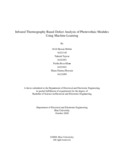| dc.contributor.advisor | Rahman, Md. Mosaddequr | |
| dc.contributor.author | Mobin, Ovib Hassan | |
| dc.contributor.author | Tajwar, Tahmid | |
| dc.contributor.author | Khan, Fariha Reza | |
| dc.contributor.author | Hossain, Shara Fatema | |
| dc.date.accessioned | 2021-03-21T07:54:00Z | |
| dc.date.available | 2021-03-21T07:54:00Z | |
| dc.date.copyright | 2020 | |
| dc.date.issued | 2020-10 | |
| dc.identifier.other | ID: 16321145 | |
| dc.identifier.other | ID: 16321051 | |
| dc.identifier.other | ID: 16321021 | |
| dc.identifier.other | ID: 16121095 | |
| dc.identifier.uri | http://hdl.handle.net/10361/14367 | |
| dc.description | This thesis is submitted in partial fulfillment of the requirements for the degree of Bachelor of Science in Electrical and Electronic Engineering, 2020. | en_US |
| dc.description | Cataloged from PDF version of thesis. | |
| dc.description | Includes bibliographical references (pages 71-74). | |
| dc.description.abstract | Solar photovoltaic (PV) has gained much attention throughout the world for clean energy production. Faults in the PV modules cause the reduction of the amount of the electricity gain from the PV systems. Detecting faults of PV modules could help to take necessary measures. In this study, Infrared thermography (IRT) is used in order to take images of PV modules which may indicate the hotspot. Later, these images are converted into datasets for a classifier to detect the hotspot of PV modules. Besides, I-V characteristics of the PV modules are also analyzed to find out the relation between hotspot & defected area. The further part of this study has been conducted by using a machine learning tool called ‘YOLO: You Only Look once’. After training & testing the learner with the datasets, the outputs are validated with the IRT images of PV modules. The major gain of this study is to apply a modified real time object detection tool to understand and detect the defect of the PV module. The algorithm is capable of detecting the hotspot using the weightage file of the training phase. Result shows that with more diversified datasets the accuracy of detecting hotspot increases. | en_US |
| dc.description.statementofresponsibility | Ovib Hassan Mobin | |
| dc.description.statementofresponsibility | Tahmid Tajwar | |
| dc.description.statementofresponsibility | Fariha Reza Khan | |
| dc.description.statementofresponsibility | Shara Fatema Hossain | |
| dc.format.extent | 76 pages | |
| dc.language.iso | en_US | en_US |
| dc.publisher | Brac University | en_US |
| dc.rights | Brac University theses are protected by copyright. They may be viewed from this source for any purpose, but reproduction or distribution in any format is prohibited without written permission. | |
| dc.subject | Infrared thermography | en_US |
| dc.subject | YOLO | en_US |
| dc.subject | Photovoltaic | en_US |
| dc.subject | Hotspot | en_US |
| dc.subject | Machine learning | en_US |
| dc.title | Infrared thermography based defect analysis of photovoltaic modules using machine learning | en_US |
| dc.type | Thesis | en_US |
| dc.contributor.department | Department of Electrical and Electronic Engineering, Brac University | |
| dc.description.degree | B. Electrical and Electronic Engineering | |

